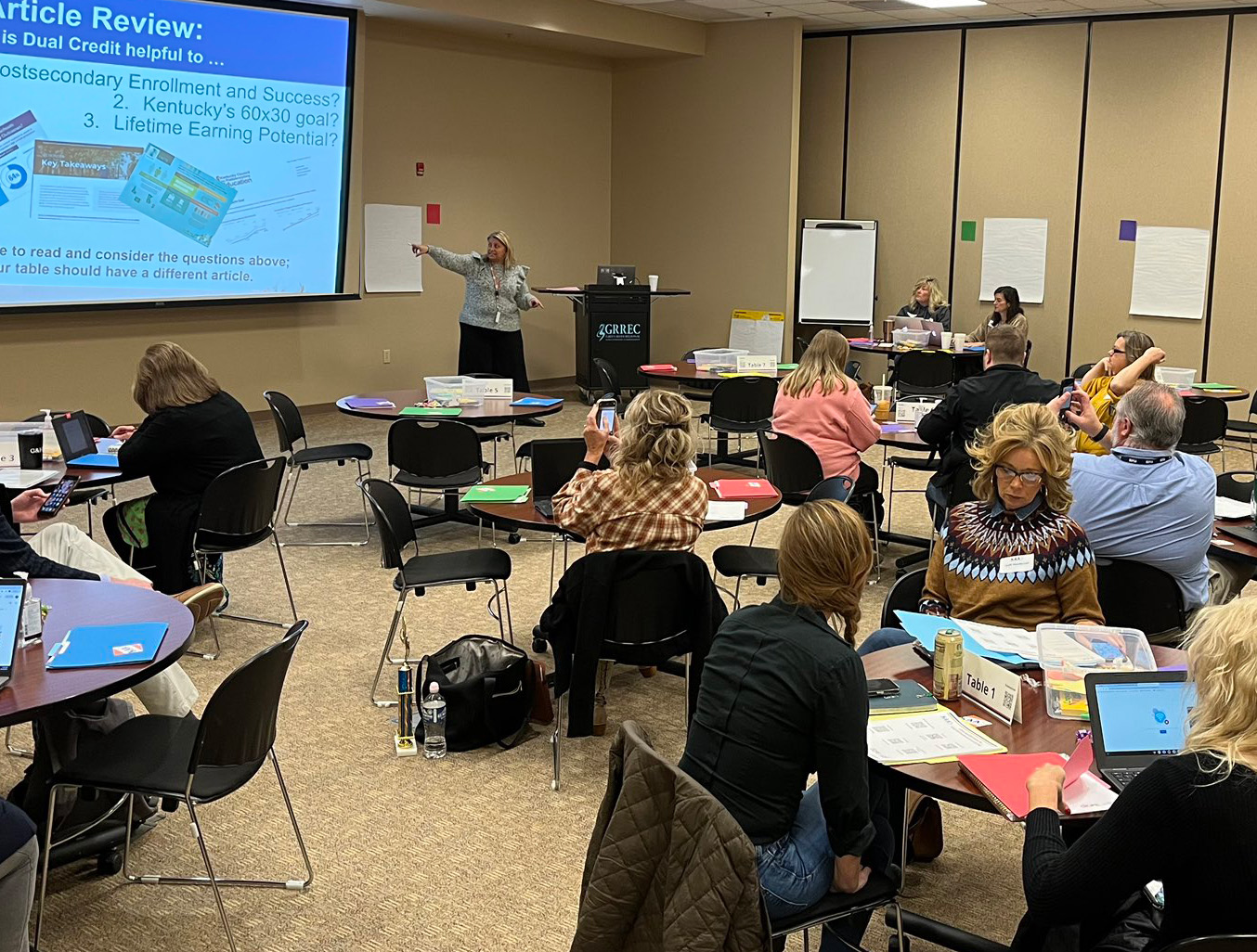Advising Kentucky’s college advisors: A Q&A with Kentucky Advising Academy Director Mitzi Holland
May 04, 2023

According to a report to the Kentucky Department of Education’s School Counselor Advisory Council, only half of a high school counselor’s time is devoted to direct student services, such as advising students on academics or personal development. Having only a half day to provide such critical services to a whole school means that counselors need to have the knowledge and resources at the ready to make advising sessions more effective and productive.
Enter the Kentucky Advising Academy (KAA), an initiative of the Kentucky Council on Postsecondary Education. This grant-funded project was created to provide professional learning and networking opportunities for school counselors and all P-12 educators in postsecondary education advising roles.
After a year, CPE Communications checked in with Mitzi Holland, director of KAA, to learn about the initiative’s progress and what challenges high school counselors are facing.
KAA has been in overdrive this last year, with webinars, in-person professional learning, podcasts and newsletters. Tell us what things advisors want more information about.
Based on our feedback, the big need is information about career advising, which can encompass so much. It’s hard to point to just a few resources that can answer all the questions around this area, so networking opportunities that bring advisors together are a huge part of what we do.
Another need is information about K12, postsecondary and employer partnerships. Our most positive feedback has been centered around the opportunities to learn what partnerships are occurring in their region and across the state. There seems to be a big void in communications about these partnership opportunities and how to both use and strengthen them.
Speaking of partnerships, dual credit enrollment has been greatly increasing since the establishment of the scholarship. How has this new form of advising affected school counselors, and what more do they need to help facilitate it?

A big part of KAA’s work is centered around awareness, making sure advisors know that dual credit opportunities exist and then communicating those opportunities to their students. Advisors must be intentional in reaching out to students who may not pursue these opportunities on their own and show them the available possibilities. That’s how we can move Kentucky toward the dual credit goal.
Another priority area for KAA is facilitating effective dual credit partnerships. Having strong partnerships with postsecondary institutions is critical to the success of dual credit – that’s how we ensure access for any student. But let me say partnerships aren’t just between institutions on paper: active partners need to exist within the high school building, within the community, and on the college campus. Kentucky is fortunate to have so many people working toward providing these opportunities for our students.
We’ve talked about the good things related to the college transition. Let’s shift to the other end of the spectrum. Mental health and learning loss (from the pandemic) are now big players in college readiness. How are advisors handling these challenges?
We have learned from the pandemic that students have a variety of stressors, yet, they react similarly by reaching out to that one constant, their advisor/counselor. However, our advisors are not equipped to address every issue brought to them. Those answers are best provided by experts.
The challenge is to get students to that appropriate service in a timely manner. In many cases it is the timeliness that is crucial to addressing the issue at hand, whether that’s academic, mental health, social or financial struggles.
So, our goal is to educate advisors/counselors on the growing partnerships between secondary and postsecondary institutions for these services and the communications around them. Building this stronger network of partners, as well as a clear and concise communication plan, can help students better navigate the academic readiness world and make a smooth transition from high school to postsecondary.
A challenge facing the whole state is a declining college-going rate. What insight, if any, do advisors have about why this is happening?
As we network with advisors across the state, we often hear about the opportunities that allow students to go directly to work after high school graduation to earn a good hourly wage. This seems to be appealing to high school students, as they are often looking for immediate gratification.
For these students who don’t wish to pursue “college” in the traditional sense, we need to promote early postsecondary opportunities. Many students can earn certificates and even associate degrees prior to high school graduation, equipping them for careers rather than jobs. But let me add that, as part of that, we need to improve advising around stackable credentials if those students choose to attend college later. There is a lot of confusion around dual credit and how those courses and credentials figure into the transfer equation.
Overall, what have you and your staff learned and what is in KAA’s future?
Kentucky’s secondary educators are committed to supporting their students in their future successes, but we have learned many opportunities are underutilized due to a lack of awareness.
KAA will continue to provide professional learning opportunities around the state to provide that awareness. Our monthly webinars and podcasts focus on timely topics to provide updates, awareness and spotlights for postsecondary advising programs.
Also, KAA launched a Postsecondary Advising Online Toolkit. To follow up on that, we are working on a statewide partnership handbook, as well as a timeline of postsecondary advising activities and events for educators serving in an advising role. We want to spread the message to all Kentucky educators, as well as business and community organization members, about the importance of postsecondary advising and how they can support our students in their postsecondary journey. If we all work together to support students as they transition from their secondary work to their postsecondary path, it will not only be beneficial to the student but the community and the state as well.

Get Involved
The Kentucky Advising Academy (KAA) provides a free comprehensive series of professional learning and resources for school counselors, Family Resource/Youth Service Center (FRYSC) coordinators, and all professional educators as well as flexible opportunities to connect with higher education and postsecondary advising leaders. Learn more >>
Last Updated: 5/10/2023
